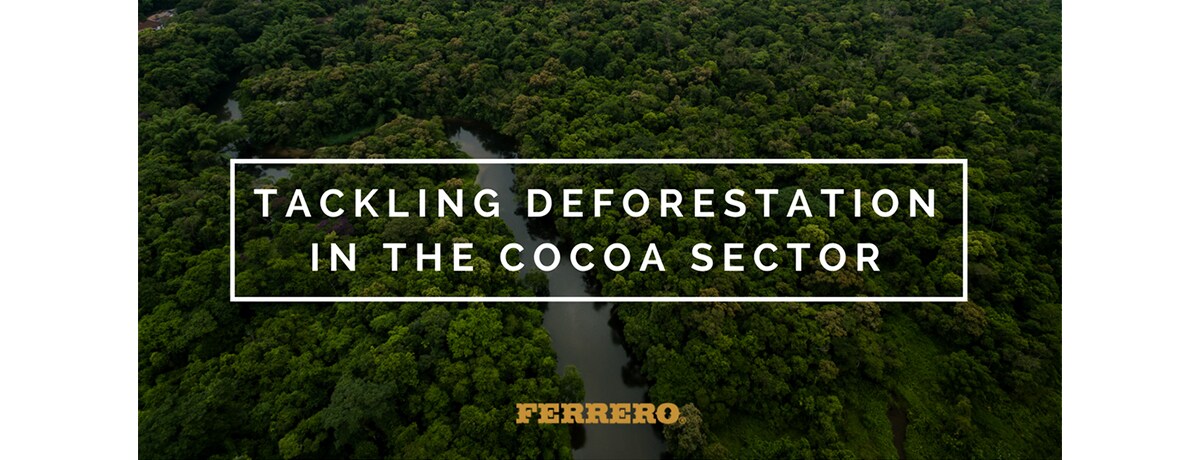Protecting the world’s forests is vital to the ongoing sustainability of cocoa supply. Yet deforestation rates are soaring in major cocoa producing countries. The result is an ongoing cycle of climate change and poor harvests, forcing yet more trees to be felled as farmers struggle to make a living. As an industry, we must encourage more sustainable ways to grow cocoa, whilst protecting the vital employment and income the industry provides for local communities. At Ferrero we are committed to tackling this serious industry challenge, by signing up to global initiatives like the UN Frameworks for Action to end deforestation and restore forest areas in the Ivory Coast and Ghana. We have supplemented this with a series of our own efforts to improve traceability and sustainability in the entire cocoa supply chain and support the social and economic development of farming communities. Cocoa production is estimated by some to have resulted in global forest loss of 2-3 million hectares between 1988 and 2008. The problem of deforestation of tropical rainforests is particularly acute in the Ivory Coast and Ghana, the world’s two biggest cocoa producers. Over a decade, nearly three million hectares of forests have been cleared in these countries, with cocoa production linked to a quarter of these losses. The problem occurs when farmers clear forests to plant cocoa trees. But in doing so, they unwittingly drive higher CO2 emissions and reduced rainfall, which results in poor yields. The lack of shade trees also exposes the cocoa plants to the fierce heat of the sun, further damaging crops. The cycle repeats itself as the farmers have no option but to deforest new areas in order to produce greater yields. What we’re doing There is not one simple solution to these problems, and we must all work together as an industry to tackle the challenges leading to deforestation, from the ground up. We need to gain better visibility of land use and forest cover, improve monitoring of the entire cocoa supply chain, and invest in training for farmers and sustainable agricultural practices. There is also a need to invest in income diversification for cocoa farmers by developing mixed agro-forestry systems and more diverse food crops. As one of the world’s biggest chocolate producers, Ferrero is committed to tackling these challenges to help bring a stop to deforestation in the cocoa sector. That is why we’ve signed up to a range of important industry initiatives, and rolled out our own programmes to improve visibility and traceability in the supply chain, and support socially and environmentally sustainable cocoa production. As part of Ferrero’s commitment, the company has: • Signed the United Nations’ New York Declaration on Forests in 2014 and endorsed the High Carbon Stock Approach (HCSA); a methodology enabling companies to understand the forest areas that need to be protected for their high carbon and biodiversity values • Signed the Cocoa and Forests Initiative letter of intent in March 2017. This framework — driven by the International Sustainability Unit, the World Cocoa Foundation and the Dutch Sustainable Trade Initiative — aims to develop an actionable suite of measures to end deforestation and forest degradation • Committed to the Frameworks for Action in the Ivory Coast and Ghana. The aim of the UN initiative is to improve forest protection and restoration, sustainable cocoa production and farmer livelihoods. As part of the framework, the chocolate industry will enforce verifiable monitoring systems for traceability from farm to first purchase point, and work with the governments of the two countries to develop a national framework for traceability across the supply chain. • Ferrero will have mapped 100% of its cocoa supply chain to “farm-gate” level by the end of 2019 This crucially allows us to identify areas of to intervene with reforestation and distribution of local shadow trees • Worked with Airbus Defence and Space to use satellite maps to monitor land-use change over time and help in the fight against deforestation in the supply chain • Committed to a collateral agreement with other partners not to buy palm oil from areas with recent deforestation. Ferrero has been a member of the Roundtable on Sustainable Palm Oil (RSPO) since 2005, and in January 2015 achieved 100% segregated RSPO-certified palm oil in its products— one year ahead of its original target. In 2013 we also developed our own Palm Oil Charter to go beyond RSPO-certification • Been evaluated as a leader by Greenpeace for sustainability progress, out of 14 global consumer goods manufacturers with “no deforestation” policies in place. Ferrero was also the only company that could trace almost 100% of palm oil back to the plantation it was grown on. In 2016 the WWF International Palm Oil Scorecard placed Ferrero as one of the most sustainable of 137 global companies • Continued to improve the livelihood of farmers and communities through partnerships with Fairtrade & Cooperative Union ECOOKIM, Save the Children and more Deforestation is a major challenge facing the cocoa industry, but with global initiatives and the commitment of key stakeholders like Ferrero, we are confident we can make progress. In particular, the mapping of our entire cocoa supply chain by the end of this year is a vital effort which will help us to identify problem areas and take action where it is most needed.
2018-01-19
Our commitment to tackle deforestation in the cocoa sector



